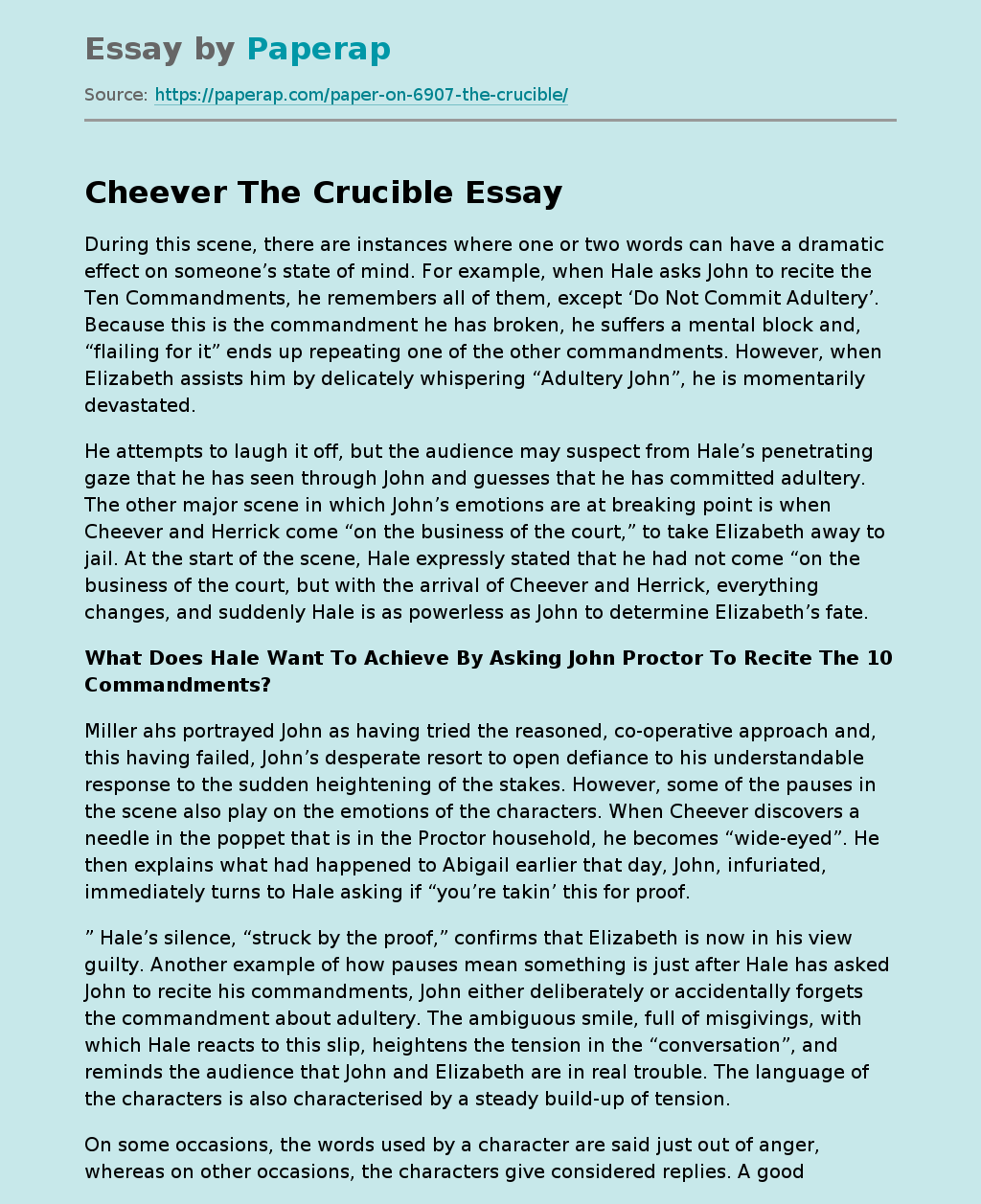Cheever The Crucible
During this scene, there are instances where one or two words can have a dramatic effect on someone’s state of mind. For example, when Hale asks John to recite the Ten Commandments, he remembers all of them, except ‘Do Not Commit Adultery’. Because this is the commandment he has broken, he suffers a mental block and, “flailing for it” ends up repeating one of the other commandments. However, when Elizabeth assists him by delicately whispering “Adultery John”, he is momentarily devastated.
He attempts to laugh it off, but the audience may suspect from Hale’s penetrating gaze that he has seen through John and guesses that he has committed adultery. The other major scene in which John’s emotions are at breaking point is when Cheever and Herrick come “on the business of the court,” to take Elizabeth away to jail. At the start of the scene, Hale expressly stated that he had not come “on the business of the court, but with the arrival of Cheever and Herrick, everything changes, and suddenly Hale is as powerless as John to determine Elizabeth’s fate.
What Does Hale Want To Achieve By Asking John Proctor To Recite The 10 Commandments?
Miller ahs portrayed John as having tried the reasoned, co-operative approach and, this having failed, John’s desperate resort to open defiance to his understandable response to the sudden heightening of the stakes. However, some of the pauses in the scene also play on the emotions of the characters. When Cheever discovers a needle in the poppet that is in the Proctor household, he becomes “wide-eyed”.
He then explains what had happened to Abigail earlier that day, John, infuriated, immediately turns to Hale asking if “you’re takin’ this for proof.
” Hale’s silence, “struck by the proof,” confirms that Elizabeth is now in his view guilty. Another example of how pauses mean something is just after Hale has asked John to recite his commandments, John either deliberately or accidentally forgets the commandment about adultery. The ambiguous smile, full of misgivings, with which Hale reacts to this slip, heightens the tension in the “conversation”, and reminds the audience that John and Elizabeth are in real trouble. The language of the characters is also characterised by a steady build-up of tension.
On some occasions, the words used by a character are said just out of anger, whereas on other occasions, the characters give considered replies. A good example of a shrewd talker is Giles, as his arguments in favour of releasing his wife and the other accused women are fairly persuasive and clever. At one point, Giles tries to make Cheever feel bad about what he is doing: “an honest tailor might have gone to Heaven must burn in Hell. ” This language causes the audience to feel real pity for Giles and commiserate with him.
The timing and pace in this scene are mostly fast but sometimes quite slow. During the conversation between John, Elizabeth, and Hale, the pace of the conversation is quite slow, as John and Elizabeth answer Hale’s questions and try to remain calm, whereas in the conversation between Cheever, Hale, Herrick and John, the pace is much faster. This is mainly because they are interrupting each other and disagreeing with various statements said, the conversation quickly becoming very heated. This makes for good drama, as the audience will want to see what happens next between
these characters and how far John will go as the tension escalates. The two outstanding examples of the use of timing in this scene are Hale’s entrance, when “suddenly as though by air, a figure appears by the doorway. ” The audience will inevitably wonder he has been standing there, as will John and Elizabeth. The other is the sudden arrival of Cheever to arrest Elizabeth: ‘Enter Ezekiel Cheever. A shocked silence. ‘ The timing of Cheever’s entrance is a turning point as up to this point, all disputes have been discussed in a civil way.
But, at the same time, a lot of tension and anxiety must be going through Proctor’s head, so when Cheever and Herrick enter the conversation, it begins to get heated, as Proctor begins to lose his nerve, shout and get very angry with anything said about Elizabeth. There are a few moments of significant impact in this scene. Firstly, Hale has been told about why all the people have confessed to witchcraft, and this proves a quite major turning point as, Hale now begins to understand the people’s point of view. The reader would see that deep down, Hale knows that these people are most probably innocent: “It is his own suspicion,” but, he
doesn’t want to go against the court, so he has to put up an argument. Later, John makes Hale realise what is happening when he inquires about why Abigail is considered to be innocent: “Is the accuser always holy now? ” The significance of this scene to the play as a whole is, that within this scene, people like Giles and Francis now want to go to Salem, to try to get the charges against their wives dropped. However, John Proctor at the beginning of the scene was very hesitant about going to Salem, but, now he willing to go to almost any lengths to free his wife. As a result, the details of his adultery get out.
Cheever The Crucible. (2019, Dec 05). Retrieved from https://paperap.com/paper-on-6907-the-crucible/

